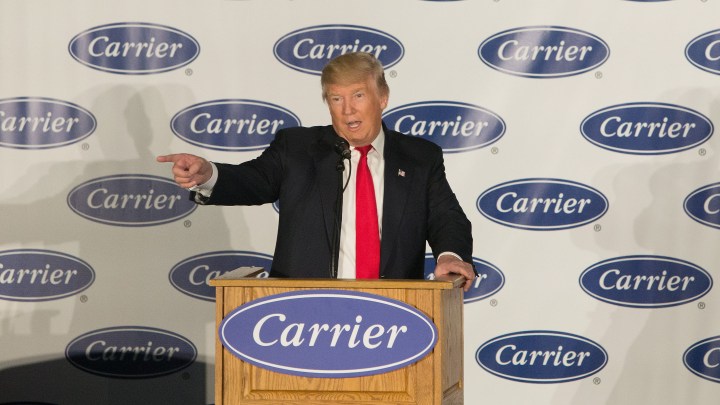
Has Trump kept his promises to U.S. manufacturing and Carrier?
Has Trump kept his promises to U.S. manufacturing and Carrier?

Four years ago, presidential candidate Donald Trump spent some time focusing on a furnace factory in Indiana owned by the Carrier Global Corporation. That factory was scheduled to close with more furnace production happening out of Mexico.
“We have leaders that are stupid people and we have leaders that are corrupt people,” Trump said at the time during a rally in Indianapolis. “They’re controlled by their campaign contributions. And, believe me, if I were in office right now, Carrier would not be leaving Indiana. That I can tell you. That I can tell you.”
President-elect Trump cut a deal to keep the plant in Indiana, in exchange for $7 million in tax breaks. It was heralded as an example of Trump’s promise to strengthen American manufacturing.
Marketplace’s Nova Safo checked back in with that community in Indiana to see if Trump kept his promises. The following is an edited transcript of Safo’s conversation with “Marketplace Morning Report” host David Brancaccio.
David Brancaccio: Nova, what did you find?
Nova Safo: Well, it’s complicated. When I visited Indianapolis right before the 2018 midterm elections, a lot of Carrier workers were unhappy with Trump, because there were still job cuts going on a couple of years after he was elected.
Fast forward to now — sales are up, Carrier has hired back many workers.
So I checked back in with Chuck Jones — he had been the leader of the local steelworkers union in 2016. He was never a Trump fan. But a lot of his union members voted for the president.
He said, yes, Carrier has maintained good-paying jobs, but he’s not seeing the same thing play out broadly in his region. Other factories are gone, and many workers who lost good-paying factory jobs are replacing them with lower-paying ones, which is all they can find.
Chuck Jones: So what happens pretty soon, they lose their automobile, they get behind in the payments. Pretty soon, their house goes. And shortly thereafter, with all the pressure of everything and not having a car, not having a house, there’s divorce. And, in some instances, people end up taking their own lives. Now, these are people, and, you know, weren’t asking for anything. All they wanted was an opportunity to have a job.
Brancaccio: How does the manufacturing sector in Indiana compare to the nation as a whole?
Safo: There’ve been ups and downs in the last few years, but manufacturing nationally just is not close to where it was in the 1990s. Over the last four years, there was some acceleration in jobs, and then it leveled off. Department of Labor statistics show we’re now where we were in mid-2014. Some of that is COVID-related, but not all.
For example, a Federal Reserve analysis found that the trade war with China actually ended up costing more U.S. manufacturing jobs than it created.
There’s a lot happening in the world. Through it all, Marketplace is here for you.
You rely on Marketplace to break down the world’s events and tell you how it affects you in a fact-based, approachable way. We rely on your financial support to keep making that possible.
Your donation today powers the independent journalism that you rely on. For just $5/month, you can help sustain Marketplace so we can keep reporting on the things that matter to you.












